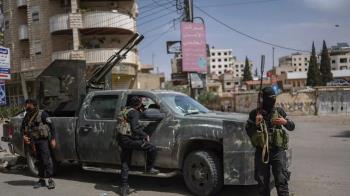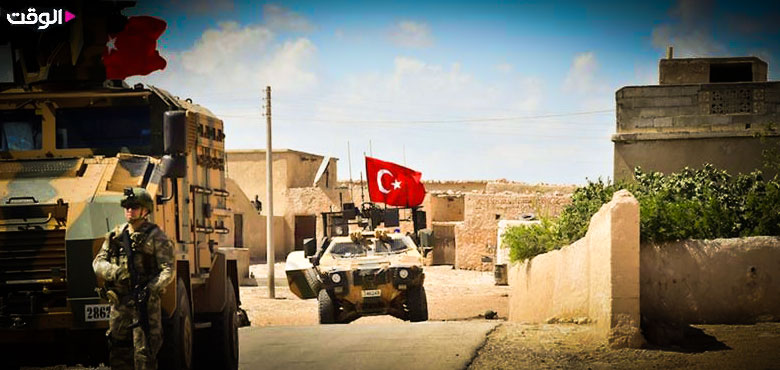Alwaght- The Syrian Observatory for Human Rights in its latest report said that Turkey started relocating the Syrian citizens in the northern areas under its control for a demographic change it sought after the war broke out in the Arab country.
The report, published on Friday, claims that Turkey removes the Syrian citizens from Jarabulus town to the borders with its territories and from there to Tal Abyad. It also forces the Syrians remaining in the regions under the control of the Turkish forces and its opposition allies to relocate to other parts of Syria.
The autonomous Kurdish administration in the north earlier issued a statement saying that Turkey displaced about 300,000 Syrians living in northeastern Syria and after coordination with the US settled in these regions the Arab Syrians who have been living in camps hosted on the Turkish soil. The administration added that the effort comes to change the demographic nature of the northeast.
Turkey now hosts 3.6 million Syrian refugees. The economic troubles in Turkey in the very recent years have promoted serious Ankara efforts to return at least part of them to their country through establishing a safe zone controlled by its forces and the allied militias. The Turkish leaders have been exploiting the same excuse to proceed with their goals for demographic changes and even its territorial expansion ambitions.
President Recep Tayyip Erdogan of Turkey and other Turkish politicians, however, have frequently dismissed the Syrian and foreign condemnations saying that their military actions in Syria’s north have counterterrorist nature and that they have no expansionist ambitions in the Arab country. Damascus leaders repeatedly reject the Turkish claims arguing that Turkey’s words contradict the realities on the ground. The veracity of the Turkish rejection can be tested by throwing light on Ankara’s performance in the Syrian regions it seized over the past few years.
Afrin town: fact-checking the Turkish aims
Afrin was the first big Kurdish-majority region Turkey managed to bring under control under the Operation Olive Branch in 2018 in association with the Syrian opposition fighters. When Afrin fell to the allied forces, reports emerged about how Ankara employed various tactics to expose the region to demographic changes.
The Syrian Observatory in 2017 reported that a number of Kurdish-inhabited villages in the northeast were looted by the Kurdish-backed militias. The report referred to several cases of car and farming machinery thefts and house robberies. Many of the Afrin residents, the monitoring organization continued, ended up with homes fully emptied.
While the restrictions set up ahead of the residents of these areas over the past two years have forced many of them to abandon their homes, the transfer of Syrian refugees from the Turkish territories to Afrin within this period continued. According to figures issued by the Turkish interior minister, about 330,000 Syrian refugees settled in Afrin on the heels of the Operation Euphrates Shield that was launched in early 2018.
The efforts to destroy the historical documents of the identity in the northern Syria are other parts of Turkey’s measures in Afrin and other seized areas. The Syrian Arab News Agency in March 2018 reported that the Turkish forces and their allies, mainly the Free Syrian Army that comprises the defected military personnel and opposition fighters, did not stop at displacing the civilians in Afrin and looting their assets but also targeted and destroyed 3000-years-old historical sites that are registered as world heritage by the UNESCO. The report suggests that the Turkish-allied militants destroyed Ain Darah temple and Alnabi Hori Qursh and Tel Jandaris cemeteries in Afrin.
Meanwhile, Erdogan’s plan to appoint a governor to Afrin gave away the fact that Turkey has no plan, at least in the near future, to submit Afrin and other areas like Jarabulus, Azaz, and Al-Bab to the Syrian central government.
Turkey’s pressure on Europe
Here is the Turkish ruling Justice and Development Party’s plan for north and northeast Syria: Settling 1 to 2 million Arab Syrian refugees along with founding 10 cities and 140 villages with a foreseen budget of about $27 billion. But now the plan faces serious challenges. First one: So far the military operations have brought under Turkey’s control an area of only 120 square kilometers which is way smaller than the 444 square kilometer area Erdogan foresaw for implementation of the project. This means the number of those planned to be returned is smaller than planned.
Second one: The recent economic problems erode Ankara’s capability to lonely provide costs of hosting the Syrian refugees. Turkey sets eyes on Qatar’s help on the one hand and puts under pressure the European countries on the other hand. Opening the doors for the refugees to Europe and handing over the ISIS fighters to their European countries are the main Turkish pressure tools. Last month, Turkey’s Interior Minister Suleiman Suelu said that his country begins expelling the ISIS fighters adding that “Turkey is not a hotel” for foreign terrorists.
Such measures, seen by Europe as a threat, not only triggered European condemnation of Turkey’s military operation in the Kurdish regions but also encouraged the European seeking of ways to solve the problem via opening contact channels with the Syrian government. In October, Sweem Dagdalen, the head of the left-wing majority in the German parliament, said that EU should invest to rebuild Syria instead of giving Turkey billions of dollars as the guardian of the European gates against the influxes of refugees. Andrias Nick, a lawyer of Germany’s ruling Christian Democratic Alliance, told DW news agency that returning the Syrian refugees to their country should be executed in line with the international laws. “EU and Germany will never offer economic support to a forced return of them”, he said. Following the comments, a German parliamentary delegation visited Damascus and discussed the issue with the Syrian President Bashar al-Assad.



























